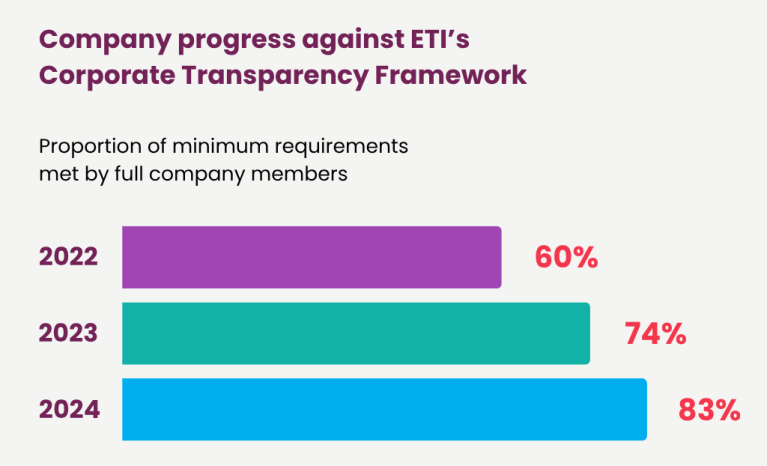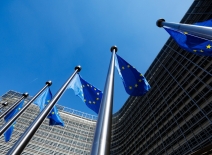
Responsible business is at a turning point. From emerging due diligence laws, and the impacts of climate breakdown, to increasingly complex risk landscapes and widening inequality. Global supply chains are under greater pressure than ever before.
In several countries, and now across Europe, human rights due diligence (HRDD) is being made a legal obligation. In this context, codes of conduct, certification or audit alone aren’t going to cut it. Businesses face a clear choice: continue relying on fragmented, compliance driven approaches that fail to identify, let alone address, some of the worst human rights abuses, or adopt deeper, more collaborative approaches that tackle root causes and deliver real, worker-centred impact.
At ETI we work together with NGOs, trade unions and companies, to support them with the latter. Our impact report - Driving Responsible Business – tells the story of what that looks like in practice, and how ETI and our members deliver impact together.
Our impact in 2024-25
Across our membership, we saw meaningful progress in how companies understand, manage and respond to human rights risks. Here’s a glimpse of this year’s report highlights:
- Stronger, more transparent human rights due diligence as company members advance through, and publicly report against, ETI’s Corporate Transparency Framework (CTF).
- New strides in accountability as ETI made company member performance against the CTF public on our website.
- Significant improvements in responsible purchasing practices, supported by peer learning and practical tools that help companies address some of the root causes of poor working conditions.
- Real gains for workers, including improved information on the rights and risks for migrant workers, access to pilot worker-driven grievance mechanisms, and training on topics including social dialogue, climate action, and risks of gender-based violence.
- Action in challenging and crisis-affected contexts, where coordinated, multi-stakeholder responses enabled companies to navigate heightened risks without abandoning workers.
- Influence on emerging regulation and policy, ensuring that forthcoming due diligence requirements reflect practical realities and centre the needs of workers.
These are achievements that no single company, trade union or NGO could deliver alone. They are the result of ETI’s tripartite model, bringing together diverse stakeholder to drive credible, worker-centred change at scale.
Our growth
As pressures grow and expectations rise, more leading companies, NGOs and trade unions are choosing to join us. Companies tell us they benefit not only from ETI’s expertise, tools and guidance, but from something harder to find elsewhere: a credible, collaborative space where real continuous progress can be made.
New members joined in 2024-25

ETI’s structure and governance sets us apart. Our tripartite model brings together diverse perspectives, specialised knowledge and global reach, creating a rare environment where tough conversations can happen and where shared challenges become collective solutions. By bringing together business, civil society and trade union voices, ETI drives company action grounded in worker realities, NGO expertise, and responsible business conduct; a combination that gives our work credibility with regulators, investors and consumers. It’s this combination that enables members to move beyond compliance and towards meaningful, robust, human right due diligence and the collective leverage to make systemic change happen.
Our proof
This year’s report proves our model works. From facilitating an enabling environment for human rights due diligence, driving progress and accountability among our members or collaborating for impact, our report demonstrates that tripartism works. Together we can drive positive change and advance human rights in supply chains worldwide.
Explore proof of how we did it in FY2024-25:

Looking ahead
Whether you're a long-term member or considering joining ETI for the first time, we invite you to explore the full impact report. It highlights not just what we’ve achieved, but what’s possible when business, trade unions, and NGOs work together with shared purpose.
Responsible business doesn’t happen in isolation. It happens when we bring the right people together and take action. This year’s impact shows what’s possible. Next year’s impact can include you.
ETI will launch its upcoming strategy in the coming weeks. We hope you’ll join us.
Driving Responsible Business: Our impact 2024-25
Explore our full impact report for FY2024-25.
Why join ETI
Get the support you need to build a more resilient supply chain for your business.





